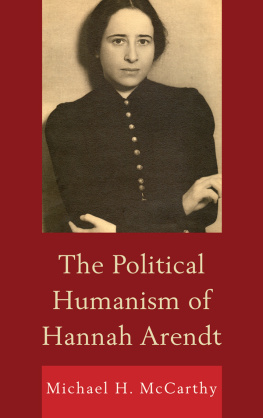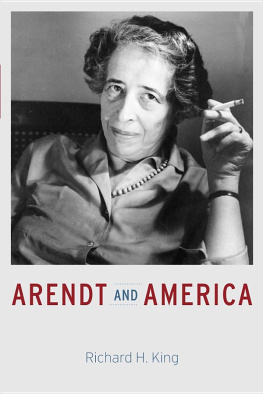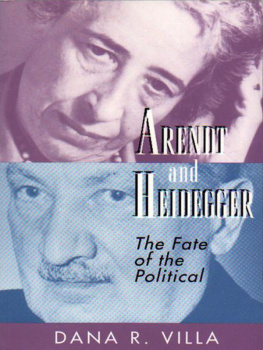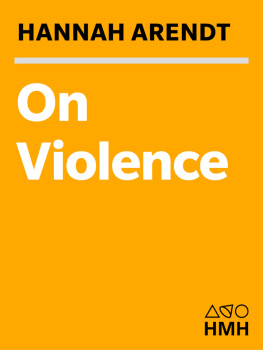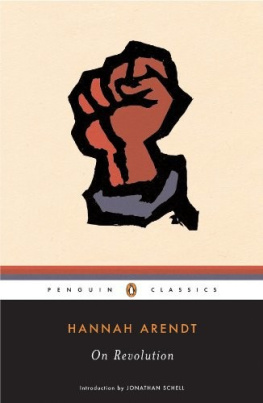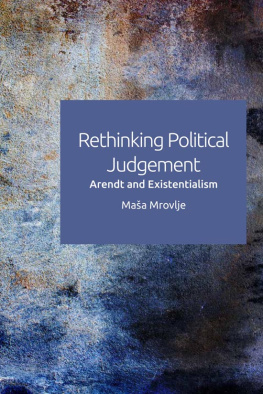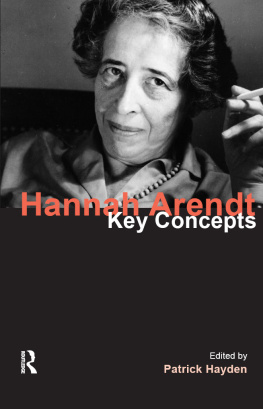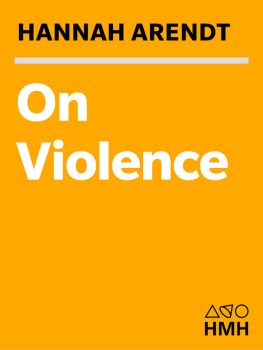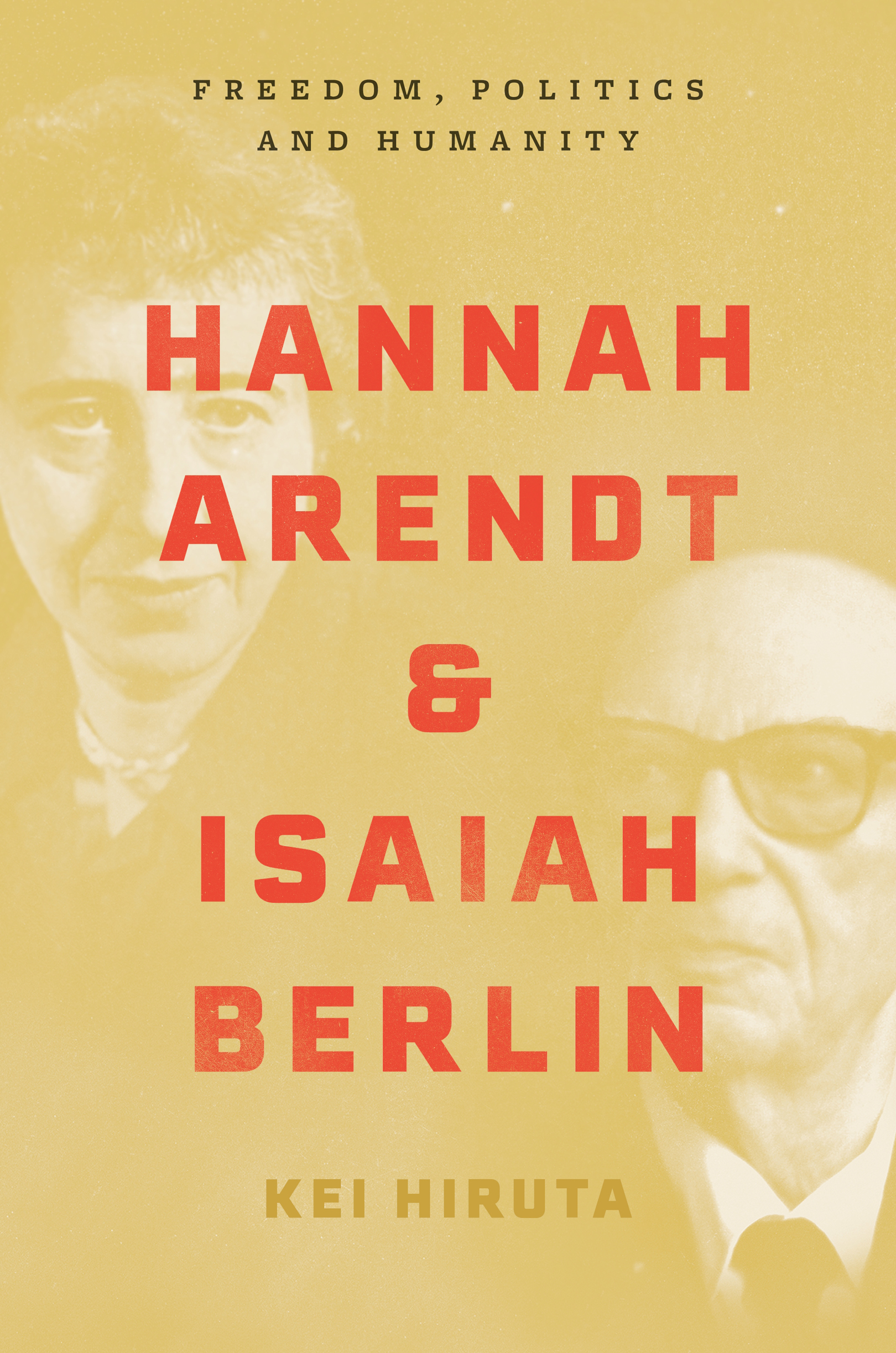HANNAH ARENDT AND ISAIAH BERLIN
Hannah Arendt and Isaiah Berlin
FREEDOM, POLITICS AND HUMANITY
KEI HIRUTA
PRINCETON UNIVERSITY PRESS
PRINCETON & OXFORD
Copyright 2021 by Princeton University Press
Princeton University Press is committed to the protection of copyright and the intellectual property our authors entrust to us. Copyright promotes the progress and integrity of knowledge. Thank you for supporting free speech and the global exchange of ideas by purchasing an authorised edition of this book. If you wish to reproduce or distribute any part of it in any form, please obtain permission.
Requests for permission to reproduce material from this work should be sent to
Published by Princeton University Press
41 William Street, Princeton, New Jersey 08540
6 Oxford Street, Woodstock, Oxfordshire OX20 1TR
press.princeton.edu
All Rights Reserved
Library of Congress Cataloging-in-Publication Data
Names: Hiruta, Kei, 1981 author.
Title: Hannah Arendt and Isaiah Berlin : freedom, politics and humanity / Kei Hiruta.
Description: Princeton, New Jersey : Princeton University Press, 2021. | Includes bibliographical references and index.
Identifiers: LCCN 2021011347 (print) | LCCN 2021011348 (ebook) | ISBN 9780691182261 (hardback) | ISBN 9780691226132 (ebook)
Subjects: LCSH: Political sciencePhilosophy. | Arendt, Hannah, 19061975. | Berlin, Isaiah, 19091997.
Classification: LCC JA71 .H58 2021 (print) | LCC JA71 (ebook) | DDC 320.01dc23
LC record available at https: / /lccn.loc.gov/2021011347
LC ebook record available at https: / /lccn.loc.gov/2021011348
Version 1.0
British Library Cataloging-in-Publication Data is available
Editorial: Ben Tate and Josh Drake
Production Editorial: Kathleen Cioffi
Jacket Design: Lauren Smith
Production: Danielle Amatucci
Publicity: Alyssa Sanford and Amy Stewart
Copyeditor: Francis Eaves
Jacket images: (top left) Hannah Arendt, 1949 / dpa Picture Alliance / Alamy; (bottom right) Isaiah Berlin, 1995 / Agence Opale / Alamy
CONTENTS
HANNAH ARENDT AND ISAIAH BERLIN
1
Introduction
Years ago, I brought Hannah and Isaiah together. [] The meeting was a disaster from the start. She was too solemn, portentous, Teutonic, Hegelian for him. She mistook his wit for frivolousness and thought him inadequately serious.
ARTHUR SCHLESINGER JR.
IN 1991, the American philosopher Norman Oliver Brown wrote to his friend and former tutor Isaiah Berlin,
The strong dislike for Arendt that Berlin expressed in his 1991 letter to Brown has a long history. It began a half-century earlier, when the two thinkers were introduced to each other in wartime New York. Not much is known about this meeting, but their opinions were certainly different and their personal chemistry evidently bad. The relationship between the two thinkers did not improve, to say the least, when they spoke again at Harvard University about a decade later, probably in 1949. Arthur Schlesinger Jr., the political scientist who arranged this meeting, would later recall the occasion as a disaster from the start. His contempt subsequently evolved into a lifelong hatred with the publication of Eichmann in Jerusalem: A Report on the Banality of Evil in 1963. He wholeheartedly endorsed the widespread accusation that Arendt arrogantly and patronisingly blamed the victims of the Holocaust and that she proposed a deeply flawed account of evil.
Curiously, despite his disdain for Arendt and her work, Berlin kept readingor, more precisely, skimming throughher books and articles, including neglected works such as Rahel Varnhagen: The Life of a Jewess as well as more major writings such as The Human Condition and On Revolution.
Arendt was aware of Berlins hostility towards her. This was thanks in no small part to the writer Mary McCarthy, who repeatedly disputed Berlins dismissal of Arendt, so much so that her friendship with him came to be destroyed as a result. For her, Berlin was a respectable intellectual historian and a moderately important member of what she called the Jewish establishment. His animosity towards her was met by her indifference to him, accompanied by occasional suspicion.
Things could have been different. They were contemporaries, Arendt born in 1906 and Berlin in 1909. They belonged to the group of twentieth-century Jewish migr intellectuals whose thoughts and life stories were intertwined with each other. For her part, Arendt was arrested and endured an eight-day interrogation in Nazified Germany, followed by a five-week detention in an internment camp in occupied France (where she too gave thought to taking her own life) before migrating to the United States to write The Origins of Totalitarianism. Oppression, domination, inhumanity and the subversion of politics were their existential as well as intellectual issues; so were freedom, humanity and politics.
The twin goals of this study are to trace the development of the unfortunate relationship between the historical figures of Hannah Arendt and Isaiah Berlin, and to bring their ideas into conversation. The former goal is historical and biographical in nature; the latter, theoretical. The former involves the following questions:
When and where did Arendt and Berlin meet, and what happened during those meetings?
How did the personal conflict between the two emerge?
How did Berlin develop his animosity towards Arendt, and she her indifference and suspicion towards him?
What other interactions did they have apart from their actual meetings?
These questions are worth asking not only because they form a fascinating part of twentieth-century intellectual, literary and cultural history. They are worth asking also because the personal, the political and the intellectual were hardly separable in both Arendts and Berlins lives and works. I take seriously what I believe to be an elementary truth about them both: political theory for them was more than a job or paid work. It was a vocation in the Weberian sense, and each led the life of a political thinker, embodying a distinct theoretical outlook.
The other, theoretical side of this study concerns a set of fundamental issues that simultaneously connected and divided our protagonists. They connected in that they were central to both Arendts and Berlins thought; and they divided in that they were answered by the two thinkers in conflicting ways. Those central issues may be formally and schematically stated as follows:
What does it mean for human beings to be free?
What is it like for a person to be denied his or her freedom, and deprived of his or her humanity? What are the central features of the worst form of unfree and inhumane society, known as totalitarianism, and how does this paradigmatically emerge?
How should we assess the apparent failure to resist or confront the evil of totalitarianism, such as when one is coerced into cooperating with a state-sponsored mass murderer?
What kind of society or polity ought we to aim to build if we want as many people as possible to be free and live a genuinely human life?
Arendts and Berlins sometimes overlapping and sometimes conflicting reflections on these questions will be considered in ), I briefly restate my main arguments and consider their implications for political thought and political philosophy today.
Although the story I tell in this book has many twists and turns, its backbone is simple and may be programmatically stated as follows. First, at the heart of the theoretical disagreement between Arendt and Berlin lie competing views of what it means to be human ( informs the rest of the book that focuses on the theoretical disagreement between the two thinkers.


